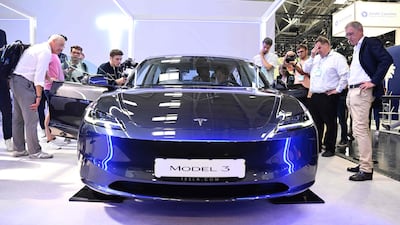Tesla revealed another round of price cuts for its vehicles in the US on Thursday, the seventh time this year that the world's biggest electric car maker has made such a move.
A variety of factors have prompted the Texas-based company to slash its prices in recent months.
Which Tesla models had their prices cut?
Tesla slashed the prices of its Model 3 and Model Y vehicles in the US by up to 4.2 per cent, according to its website.
The prices of the base and long-range Model 3 were cut by $1,250 and are now at $38,990 and $45,990, respectively, while the performance model's price was cut by $2,250 to $50,990.
For the Model Y, the prices of its long-range and performance options were reduced by $2,000 to $48,490 and $52,490, respectively. The Model Y's rear-wheel drive variant, which was reintroduced this week, stayed at $43,990.
The standard Model 3's price is now down by about 17 per cent so far this year while the Model Y's long-range option has dropped by more than a quarter.
The Model 3's price drop also comes in the run-up to deliveries of its revamped standard version, which are expected to start in the fourth quarter.
Tesla did not change the prices of its top-end Model S and Model X vehicles.
Why is Tesla cutting prices?
Two main reasons: To boost a slowing electric vehicle market and, crucially for Tesla, to fend off the competition, both from legacy car makers and up-and-coming challengers.
Global car makers are in a race to electrify their vehicles as they press forwards with strategies to drive the next phase of mobility.
This means billions of dollars in investment, apart from the creation of new jobs, pledges to meet sustainability goals and several new vehicle models that are being introduced to make the shift to the next generation of transport faster.
Car makers are promoting their respective strategies. General Motors and Volkswagen are investing billions in EVs in support of climate change goals while Stellantis plans for its European sales to be fully electric by 2030 and Toyota is ramping up production as it tries to catch up with its peers.
Despite the intense competition, industry rivals are also co-operating. Tesla has teamed up with a number of car makers, including Rivian Automotive, Polestar, GM and Ford, to allow drivers to use its charging networks across North America.
Hyundai Motor and Kia also said on Thursday that they had decided to adopt Tesla charging technology in the US.
In China, a crucial battleground for EVs, Tesla cut the price of its Model Y vehicles by $1,900 in August. The company triggered a price war in the world's second-largest economy last year that left smaller EV makers with no choice but to follow suit.
What is Elon Musk's stance on this?
The last time he spoke formally on price cuts, Tesla co-founder Elon Musk said the move was based on market conditions.
During a conference call in July, about two weeks after announcing record second-quarter deliveries, Mr Musk signalled that he would continue to cut Tesla prices during “turbulent times”.
“One day it seems like the world economy is falling apart, next day it's fine. I don't know what the hell is going on … we're in, I would call it, turbulent times,” the world's wealthiest person said at the time.
“I think it makes it does make sense to sacrifice margins in favour of making more vehicles.”
Have the price cuts worked?
To a certain extent, yes – as evidenced by Tesla's record second quarter this year.
The company delivered 466,140 vehicles – an annual surge of 83 per cent – in the three months ended June, beating analyst estimates.
Analysts surveyed by Bloomberg had expected Tesla to ship 448,350 cars in the quarter.
However, the company's deliveries fell by 6.7 per cent on a three-month basis in the third quarter as production was hampered by “planned downtime” at its factories.
Tesla delivered 435,059 vehicles in the July-September period, missing analyst estimates of 461,640 vehicles.
Manufacturers of electric cars are expected to deliver about 15 million units globally in 2023 as regulations meant to curb emissions tighten, Gartner said in a September report.
The projected figure of 14.98 million would be a surge of about 35 per cent, compared with 2022, which would represent about 97 per cent of all EV shipments this year, with the rest being 218,337 vans, 202,733 buses and 30,162 lorries, the US research firm said.















